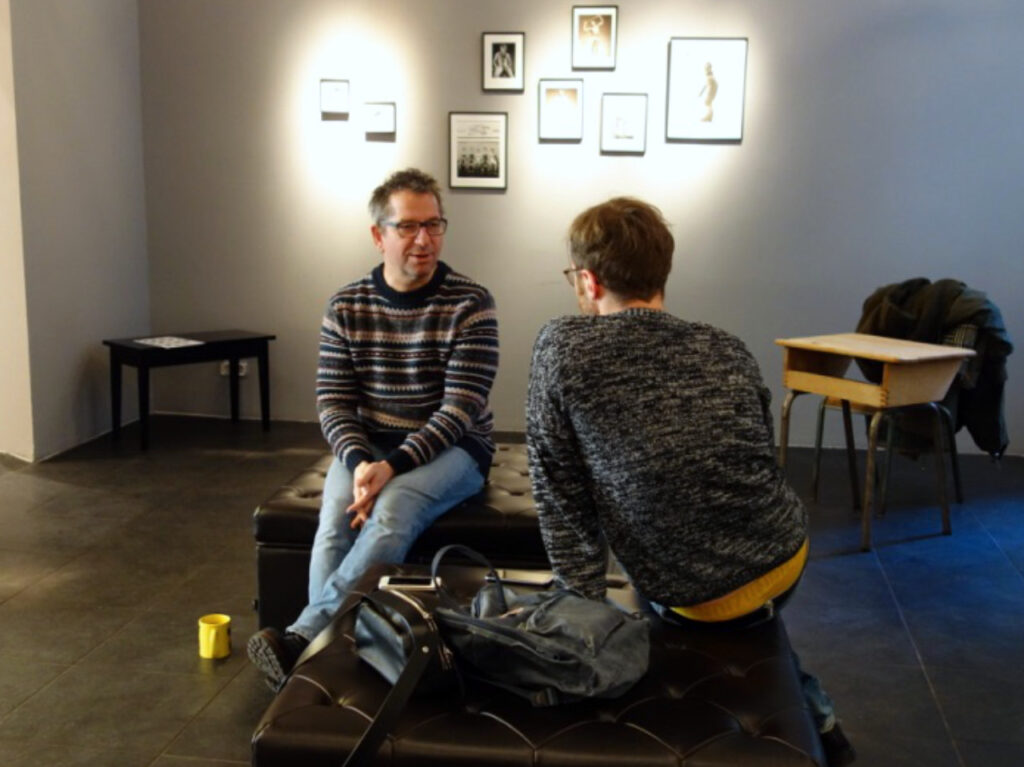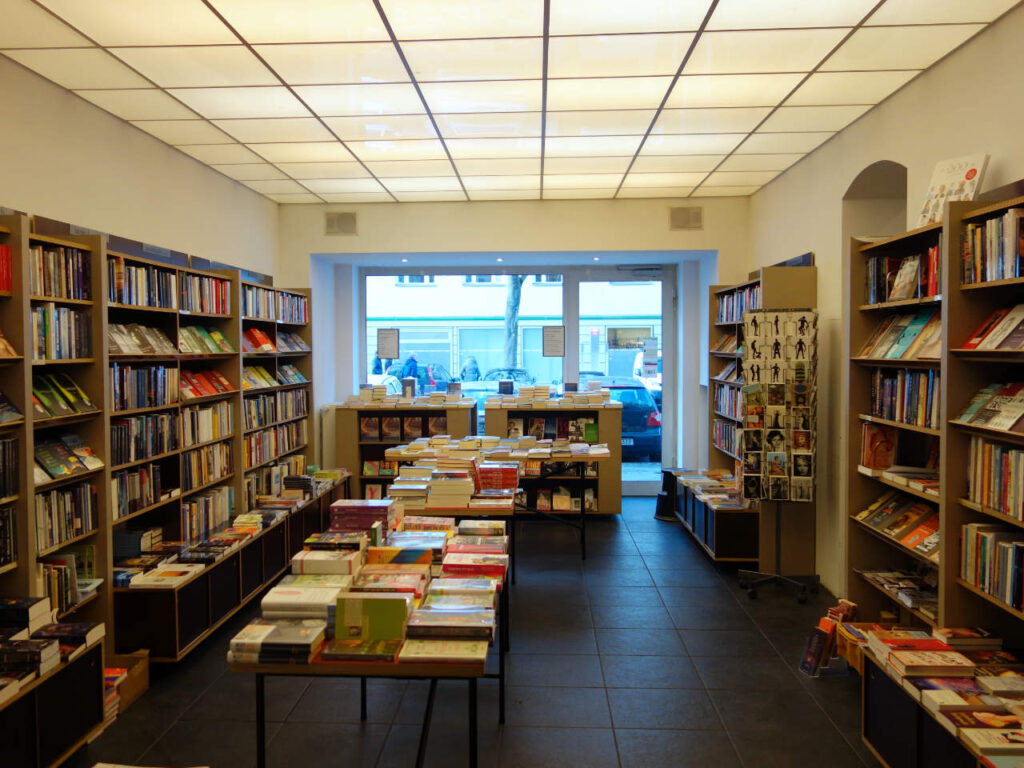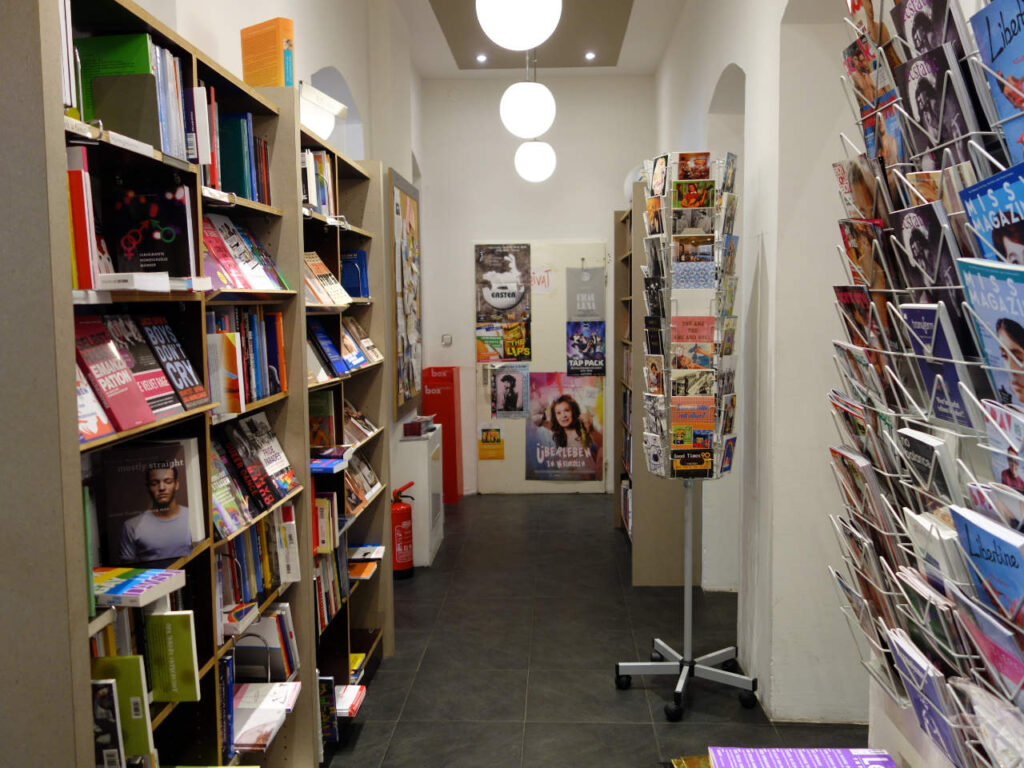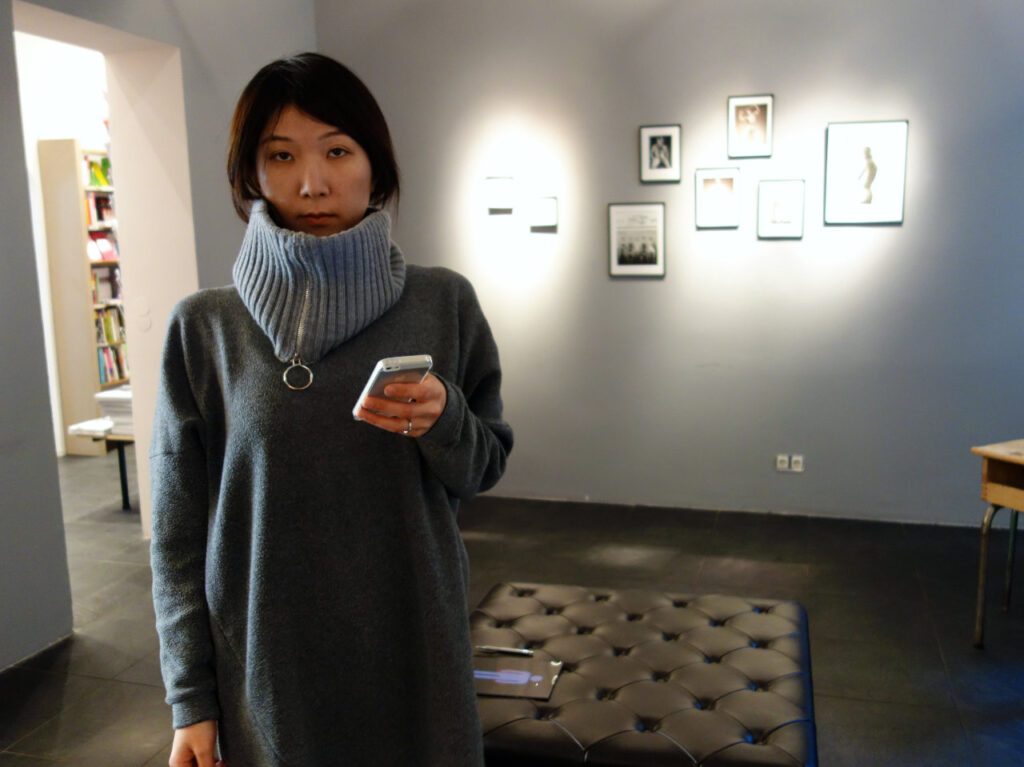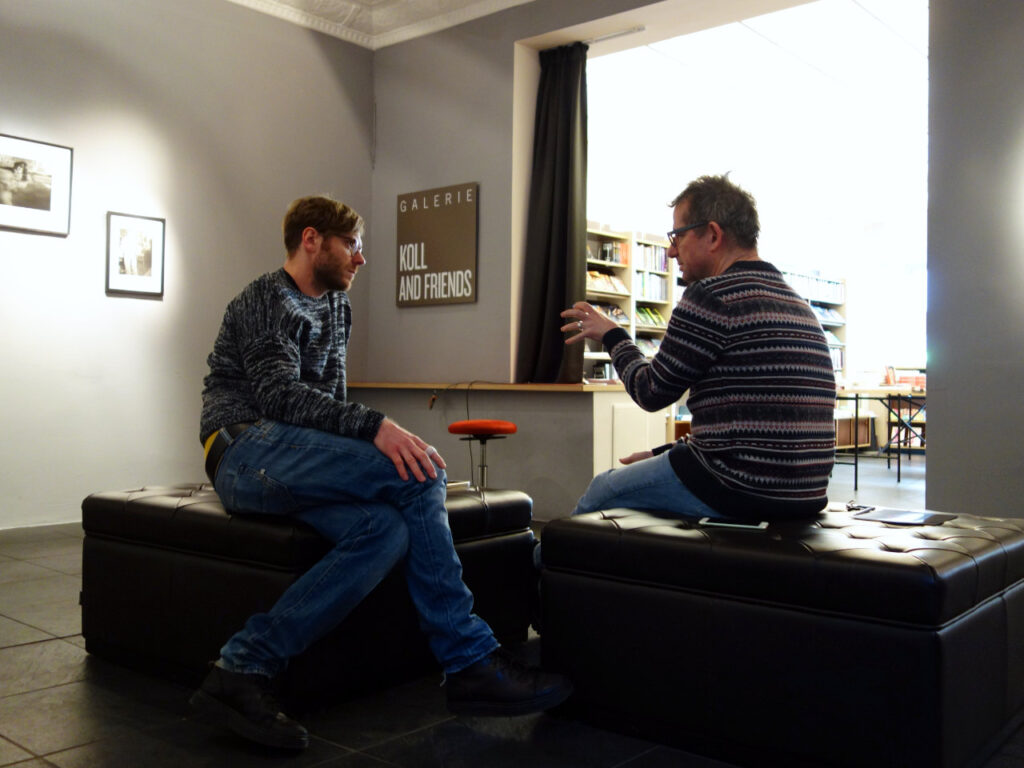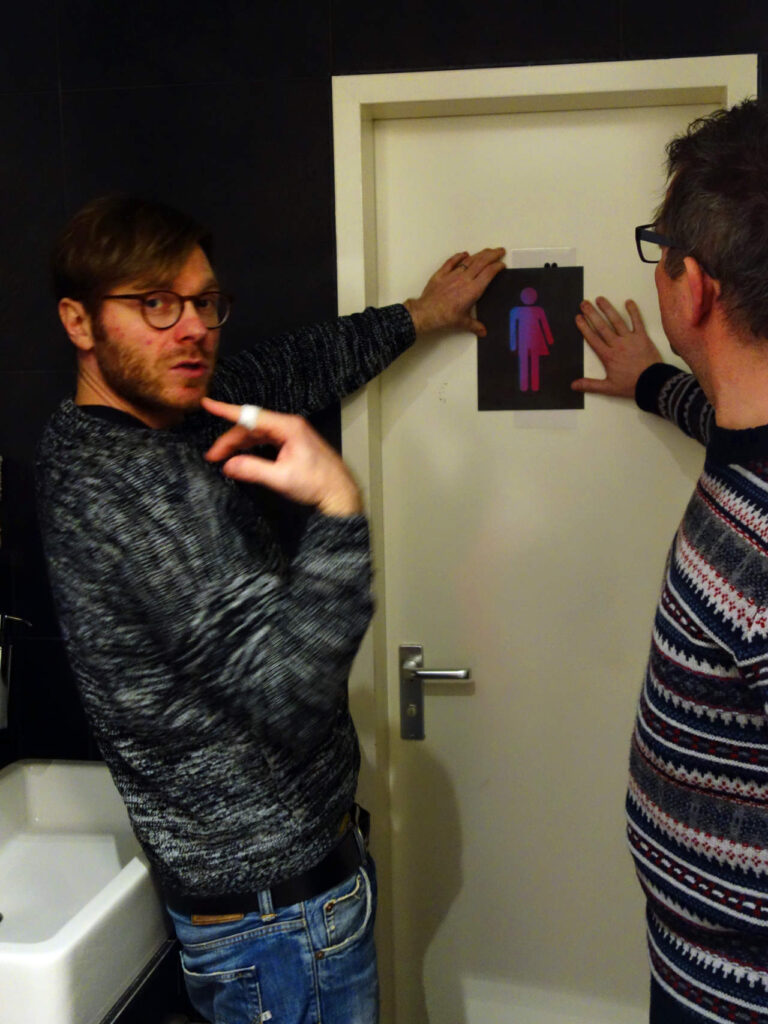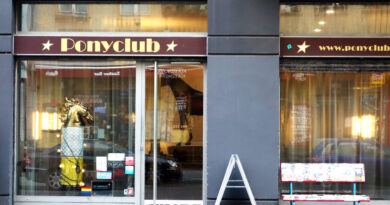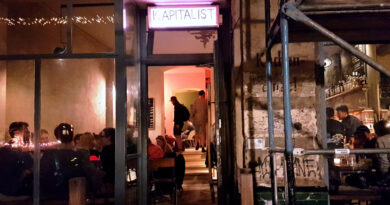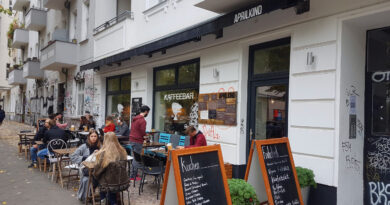CO-WC in Eisenherz bookstore
Historical, visionary bookstore for queers
Since it first opened in 1978, Eisenherz has been an amazing meet-up place for book lovers and creative people. Just stop by and enjoy their great selection of books and events. We talked with manager Franz Brandmeier about (Prinz)Eisenherz, Unisex Toilets and CO-WC.
CO-WC: (Prinz)Eisenherz is a world-famous bookstore. How did it start?
Brandmeier: I know a rough picture of it, but not exactly how it began. What I know is that four founders, working for HAW (Homosexual Action West Berlin) at that time, wanted a place to discuss political concerns and matters. In The States, bookstores had become a political hub. Following this, they opened a small bookshop in Bülowstraße in 1978.
„According to our old customers, they talked and smoked much more than selling books.“
CO-WC: (Prinz)Eisenherz was an inspiring place for various artists and activist.
Brandmeier: According to our old customers, they talked and smoked much more than selling books. The concepts of Teddy and Siegessäule were born here. At that time, there were no public places for gays to meet. That was the purpose of the shop. There was the SchwuZ to go out, there were political groups, but no place to meet. Today, you can go to Mann-O-Meter, the gay advice or LSVD. We have many institutions, and some of them have their origin in this shop. Not necessarily because people who worked here planned it, but people who came here said they need it. And it was done. It’s wonderful to see folks, gay celebrities sometimes, who haven’t been in touch for years, bump into each other. It happens all the time. This place is no longer politically engaged. It has become more private.
CO-WC: How did you come up with the name (Prinz)Eisenherz? Is there any specific meaning in it?
Brandmeier: There is no direct connection between gay and the figure itself. The bookstore was supposed to be named “Magnus Hirschfeld Buchladen.” The day before notarial certification, four founders sitting in a pub all agreed that the name was a bit boring. They came up with PrinzEisenherz – and found it somehow funny. When you think of other gay bookstores in Germany like Oscar Wild in Frankfurt or Erlkönig in Stuttgart, you see their names tell pretty much what they are. PrinzEisenherz remains somewhat confusing. I think it’s funny because you can’t nail it. Sometimes, comic fans visit our store simply judging from its name.
„Most people who tell others they visit our store say they go to Eisenherz or the Prinz.“
CO-WC: You call yourself Eisenherz now. What happened to the Prinz?
Brandmeier: The company’s name is still PrinzEisenherz Buchladen GmbH, primarily for cost reasons. We took out „Prinz“ from the store name with our second move from Bleibtreustrasse to Lietzenburgerstrasse in 2004. We wanted to become apparently gay-lesbian. A name change was obvious. First, we wanted to show we are no longer male dominated and „Prinz“ was the male part for us. Second, Most people who tell others they visit our store say they go to Eisenherz or the „Prinz.“ And third, „Prinz“ remained within the crown in the logo. Actually, nobody was deeply interested in the renaming, even women we wanted to reach. A logo works better than a long name anyway.
CO-WC: You have positioned yourself anew. Can you put a finer point on that?
Brandmeier: This has a lot to do with us, Roland and me. As we moved to Lietzenburgerstrasse the store structure changed from a „collective“ to a limited company with two managers. This affected our re-orientation. But the spirit of the time was changing as well. Customers started to ask why there was no section for bisexuality. It wasn’t very well recognized in the homosexual culture until then. You can say, it added up, and we wanted the gay-lesbian store evermore.
„Linguistic restrictions are awful.“
CO-WC: What means „queer“ to you?
Brandmeier: I’m not a queer fascist. Linguistic restrictions are awful. Queer means to me what we now understand by the former term gay. The old term wants a lot more than just more rights or tolerance for gays. You want to live it, set an example. We were not about to serve a fashion concept. We ́ve got our idea, and with it, our store is evolving. It ́s not a profitable business. Our clients are mainly gay men. They neither used to be in favour of gay-lesbian nor are they supporting queer today. For our part, we like the mix of customers and we want a bigger spectrum.
CO-WC: What is a good seller?
Brandmeier: Gay products in general sell best. The amount of lesbian products was less than 10% of total sales last year. This is low for the effort we do. We would make more money focusing only on gay men. But this would be contrary to our idea of our target group and the shop would not have the spirit it has today. We would not have all the discussions on gender, the queer booklets that bring us a young audience and so on. We want to have our concept, and we can’t get older with gay men only.
„Many young people stop by.“
CO-WC: Do you have many young customers?
Brandmeier: Since we moved to Motzstrasse in 2013, Berlin ́s famous gay district Schöneberg, many young people stop by. This cannot be fully explained. We have not changed our content so much. There are no completely different products. And the location, we assumed, is more for older people who like to go to sex pubs in the evening. Anyhow, we are happy about everyone.
CO-WC: Do you have issues with customers sometimes?
Brandmeier: Men stayed away because they did not want to be served by a woman, and vice versa women do not come in because men are here. This is beyond my imagination. But it changes more and more. I have the impression that people who come here fit together since a few years.
„For Eisenherz, we want everything with a gay and nowadays queer connection.“
CO-WC: You have a diverse range of products. What are the selection criteria?
Brandmeier: For Eisenherz, we want everything with a gay and nowadays queer connection. The selection depends on our taste as well. We have things we don’t really like. But basically we want to be into the products we sell. The store has gotten a literary focus recent years, and we probably lost some customers who love kitschy stuff. However, we don’t want to distinguish between high and popular culture. For example, we wanted to have porn from the beginning. Our ideal customer is the typical gay man who buys Proust and a porn.
CO-WC: Do people take a special interest in anything?
Brandmeier: No one reads theory with enthusiasm at the moment. In the 80s and 90s, people read many nonfiction books. It has changed. We noticed that by decreasing sales. Same thing with poetry, sales continued to drop. If we sell one volume today, we would crack a joke that it’s booming. Stories do sell, like stories of gays in Berlin based on their personal experiences.
CO-WC: Time has changed. People who used to fight hard for their rights are now stabilizing their identity. Maybe this is why they want to read more about themselves, for an inner satisfaction.
„It is crucial for us not to exclude anyone.“
CO-WC: This space gives a private, secure feeling.
Brandmeier: Many people say they want a safe room. They want a safe room. It is crucial for us not to exclude anyone. Our shop is for all queers as long as they are compatible. I think it’s important to keep a place like this.
CO-WC: This is important for us, as well. To be able to embrace everybody is crucial for queers. First come in and find out who you are. Do not set a border between you and me from the beginning. Keep it open and see what we can do or what we can be. That is ideal for us.
CO-WC: This place is very private and comfy. It can be very inviting for people, but some might be scared to enter.
Brandmeier: There are often personal reasons why someone does not dare. I experienced it myself and I know it about many customers. I studied in Stuttgart. When I had my coming-out, I knew there was a gay bookstore. I always walked up and down wondering if anyone saw me. And then, when I went inside, I was completely unsure of what to do. I remember, at first, I found it too asexual. I thought I would be overwhelmed by gay sex. There was no such thing. What we can do is to keep a place where people can come in with their fears, get used to it and realize it is safe.
CO-WC: Interpersonal relations are very important to you.
Brandmeier: We love to be booksellers, and we love talking to people coming here. Before we moved, we first asked ourselves, do we really want it, is it fun, and do our customers still want this bookstore. And we realized quickly that we were very fond of it and our customers value us – that was it. And then we asked ourselves how to make a change. The first question was, what we can do that Amazon cannot do. To sit here and talk to people with enthusiasm about books and just make it happen.
„Eisenherz’s events are small, special and cost little money.“
CO-WC: You organize readings and exhibitions as well. Please tell us more about it.
Brandmeier: There are many reasons for it. Organizing events is more effective than high-cost ads. We appear in the (print) media without paying anything. Above all, we like it. And we get so many requests. We actually do much more than can handle. Since a few years, it is a rule that we only organize events that we really want. Of course, we do people a favor as well. Sometimes, you just can ́t say no.
CO-WC: Can you specify your events?
Brandmeier: We fill a niche in the market. Eisenherz’s events are small, special and cost little money. We are not into the big business for which you have to work differently. Many times we sponsor artists while they are unknown. When they become famous, we are too small, and we do not benefit from it anymore. We are not an isolated case. Many smaller companies share this fate.
„Eisenherz just had one, and that became the public toilet.“
CO-WC: You have an All-Gender Restroom. What is behind it?
Brandmeier: To begin with, you don’t have to have a toilet in a bookstore. Eisenherz just had one. And that became the public toilet. We have one in the office as well and share it with our female colleague. There has never been a discussion about a second staff toilet. In the beginning, there was no sign on the door of the store toilet. One day, I discovered a funny signage in the newspaper. Up to now, that one has been hanging on the door.
CO-WC: The goal of the project is to establish a contemporary signpost for all-gender restrooms, as the current signage for restrooms is problematic.
Brandmeier: Our sign was similar to the old ones: it was a man/woman pictogram connected vertically. I liked it somehow. We did not think about it because it was not necessary for us.
CO-WC: There is a gap between our thinking and the image culture. We are critical and open. But when we go to a public toilet, we follow habitually und quite naturally the long-known pictograms. WC signs are deeply rooted in our culture and constitute our reality. Their influence is huge: man/ woman pictograms harden the traditional image of gender. It’s obvious that we’re not going to get out of this so easily. But we can play with it. We can re-interpret the old signs and thereby change reality. That’s what our CO-WC sign is about.
„They ask if they may use the restroom.“
Brandmeier: The discussion and excitement about unisex toilets is kind of ridiculous and incomprehensible to me. I have never had problems using a shared bathroom with a different gender or with no gender. But I know there are problems. A friend dislikes using the urinal bowl, sandwiched between guys. Many would say the same. Or, on big events there are long queues in front of women’s bathrooms, while there’s no waiting for men. All that has to do with an idea of shame and morality we have learned and that is rooted in people’s mind. I think, men and especially women are against the idea sharing a bathroom, with various reasons such as rape or violence.
CO-WC: If shared toilets were dangerous, they would have disappeared long ago. This doesn’t mean that a public toilet is always an unproblematic place. We have to stop all forms of violence, everywhere.
Brandmeier: I can’t remember that we ever had problems, neither with men, women, nor any kind of gender. People don’t ask if they may use a woman, a man or a third-gender toilet. They ask if they may use the restroom. And I think they are just happy if there is one available. People have problems with shared bathrooms. But that is only one example. For people have difficulties with people who are different in general.
CO-WC: Our project aims to raise awareness of openness, diversity, and respect. We want to build a bridge, between past and future, gender discourse and visual culture, and above all, the other in us and other people.
Franz Brandmeier, many thanks!
Prinz Eisenherz Buchladen GmbH
Motzstrasse 23
10777 Berlin
Germany
Mon-Sat: 1o am – 8 pm
Phone: +49 (30) 3139936
Mail: prinz-eisenherz@t-online.de
Homepage


